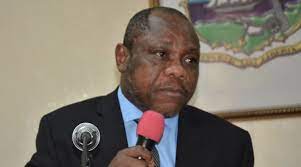On 2nd Thought: The CDC Government and its restated Budget: Reality or Pre-election bluff

By Othello B. Garblah
On Thursday, July 7, 2022, the House of Representatives passed a Draft Restated National Budget for Fiscal Year 2022 in the tone of US$806,587,341, which is an upward adjustment of US20,000,001 or 2.9 percent of the initially approved budget of US$785,587,340. It now requires the concurrence of the Senate to become a law.
A restated budget is a revision of the original budget to correct an error or to make amendments to what has been previously stated to reflect current expenditure plan. But the process has its own dangers-it can raise red flags, and highlight potential fraud or incompetence.
However, the government says its restatement is an upward adjustment and it has become necessary to address some urgent and unforeseen national expenditure demands through reprioritizing the country’s spending plan (the national budget).
Questions have been raised as to whether this move by the Coalition for Democratic Change or CDC, would become a reality or it’s just a mere pre-election campaign bluff.
The government’s decision comes six months after the country transitioned its budget calendar from July 1 to June 30, to now run from January 1 to December 31st each year.
In the previous years, Liberia’s national budgets have always been in deficit with repeated recasting to reflect a realistic revenue generation plan. In plain and simple terms, the degree of implementation of the budget over the past years has been the problem, not the quoted amount.
Implementation of the national budget is an indicator of government’s ability to deliver public services and achieve its development objectives. The difference between approved and actual spending over the budget year is an important indicator for macroeconomic stability, public service delivery, and social welfare. A non-effective implementation leads to budget shortfalls or surplus. In this case for the Liberian Government, it has often been the former.
[bsa_pro_ad_space id=1]
The Liberian population has not felt the implementation of these budgets when it comes to deliverables. The Legislature has not helped in the process either because it failed to exercise its oversight responsibility and the speed with which it passes these instruments is of concern to many. It demands performance reports from executing ministries and agencies before passing on their next request is very poor, to say the least.
This makes the beginning of the budgeting process non-transparent. Many times during these processes, some ministries and agencies repeat line items from their previous budget with flimsy explanations, yet the Budget Committee waives them on.
Economists would argue that a credibly implemented budget has only small deviations from the approved one both in terms of overall expenditure and revenues and the allocation between programs etc. But with the Liberian Government, this is far from reality, as it has proven to be in deficits, not surplus over the years.
A budget deficit/shortfall can also occur when the government spends more money than it is able to receive through revenue generations. For example, the president makes pledges within the 15 counties to implement projects not captured in the national budget for political fame.
In a real economic situation, one may argue that the deficits result from over-execution of the budgets, which may again lead to increased public debt levels and influence macroeconomic stability.
So, it is not the amount contained in the budget, what a government intends to spend, or what it wants to spend. If the budget process lacks credibility, it undermines its usefulness and implementation, eroding public trust in the government.
The government says it has increased its original budget by 2.9 percent, which is laudable. Still, if the expenditure is under-executed or revenue intake is low, beneficiaries may not receive expected services, which would question the reality of the restated budget.
That notwithstanding, care must also be taken that going into an election year the government should not overly spend the budget as doing so may result in budget deficits and increased public debt levels which are currently standing at a staggering figure for both foreign and domestic.
The latter could mean a bluff by the government to attract voters to itself while plunging the economy into a further mess.
However, the government may get her argument right, if it properly performs in the extra fiscal space it has acquired to reprioritize its existing programs, by identifying additional resources, as well as a World Bank Loan of US$15,000,000 (Fifteen Million United States Dollars.)
With recurrent expenditure estimated to be US$ 648,552,000 (Six Hundred Forty-Eight Million Five Hundred Fifty-Two Thousand United States Dollars) or seventy-nine percent of total proposed expenditure, while expenditure for public sector investment is estimated to be US$158,035,000 (One Hundred Fifty-Eight Million Thirty-Five Thousand United States Dollars) or twenty-one percent of total proposed expenditure, how these monies are spent over time will rate the credibility of the government’s budget performance.
Additional recurrent allocations have been made in the Restated Budget for it described as critical objects of expenditure such as Pension for Retired Civil Servants, Subsidy for Provision of Electricity, and Repayment of a Foreign Obligation that has fallen due.
A breakdown of recurrent allocations by major expenditure object as captured in the President’s communication to the House: Goods and Services is put at US$4,000,000, Debt Service: 1,500,000 while Social Benefits: 2,500,000 Totaling 8,000,000″.
Under the Public Sector Investment Expenditure
Highlights of allocations for Public Sector Investment Projects (PSIP) in the restatement include allocations for Obligations to the CLSG Electricity Grid, Rice Stabilization, Community Development Project, Completion of the 15th Judicial Circuit Court Complex in River Gee County and the 3rd Judicial Circuit Court Complex in Sinoe County, respectively and allocation for Solid Waste Management.

















